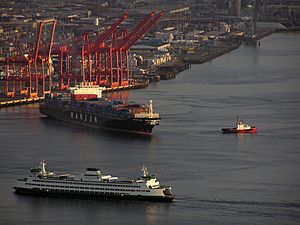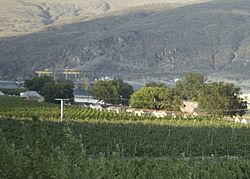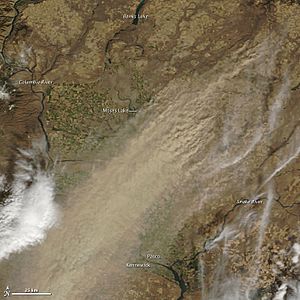Economy of Washington (state) facts for kids
The state of Washington in the northwestern U.S. has a strong economy. In 2016, its economy grew much faster than the rest of the country. In 2009, the average income for each person was $41,751, ranking 12th among all U.S. states.
Washington is home to many workers in STEM fields (science, technology, engineering, and math). The state also does a lot of trade by sea with countries in Asia. Key parts of Washington's economy include government, real estate, and information technology. Manufacturing is also important. Growing fruits and vegetables, and making hydroelectric power (electricity from water), are big industries too. Famous companies like Starbucks, Amazon, Costco, and Microsoft are based here.
Washington does not have a personal income tax. Instead, it collects money through sales tax, property tax, and a special business tax called a gross receipts tax.
Contents
Taxes in Washington
Washington is one of only seven U.S. states that does not have a personal income tax. The state also does not charge a tax on company profits or a special business fee called a franchise tax. However, businesses in Washington pay other state taxes. One main tax is the business and occupation tax (B&O). This is a tax on a business's total income, with different rates for different types of businesses.
Washington's state sales tax is 6.5 percent. Local areas add their own sales tax on top of this. This means the total sales tax you pay can be between 7.5 and 10 percent. For example, in Seattle and Tacoma, the sales tax was 10.1 percent in March 2017. The highest sales tax rates in the state are in Lynnwood and Mill Creek, at 10.4 percent. These taxes apply to both products and many services. Most basic foods are not taxed, but prepared foods, dietary supplements, and soft drinks are.
Special taxes apply to certain products like gasoline and tobacco. Property tax was the first tax in Washington. It makes up about 30% of all state and local money collected. This tax is very important for funding public schools, fire departments, libraries, parks, and other community services.
Most real property (land and buildings) and some personal property (things you own) are taxed unless the law says they are not. Most personal items owned by individuals are not taxed. However, personal property used for business is taxed. All property taxes are paid to the county where the property is located. Washington does not tax assets like bank accounts, stocks, or bonds. It also does not tax retirement income earned in another state. Washington does not collect inheritance taxes, but it does have its own estate tax on large estates after someone passes away.
Personal Income and Wealth
In 2009, the average income for each person in Washington was $41,751. This ranked 12th in the country.
Many well-known billionaires live in Washington. These include Jeff Bezos, who founded Amazon, and Bill Gates, who co-founded Microsoft. Other wealthy people in the state include Steve Ballmer (Microsoft), Craig McCaw (McCaw Cellular Communications), James Jannard (Oakley), Howard Schultz (Starbucks), and Charles Simonyi (Microsoft).
Trade with Other Countries

A lot of trade with Asia happens through the ports in the Puget Sound area. Washington is the fourth largest exporting state in the United States. Only New York, California, and Texas export more goods.
Washington's ports handle 8% of all American exports. They also receive 6% of the nation's imports.
Key Industries
Washington's economy is made up of many different industries. In 2011, the biggest parts of the economy were:
- Government services
- Real estate and rental services
- Information technology (like software and internet services)
- Making durable goods (products that last a long time)
- Retail trade (stores and shopping)
Manufacturing and Businesses
Important businesses in Washington include designing and building aircraft (Boeing). There's also a lot of computer software development (Microsoft, Nintendo of America, Valve). Online shopping companies (Amazon, Expedia, Inc.) are also big. Other key areas are electronics, biotechnology, making aluminum, and wood products (Weyerhaeuser). Mining and tourism are also important.
A survey by Fortune magazine listed four Washington-based companies among the top 20 most admired in the U.S. These were Starbucks, Microsoft, Costco, and Nordstrom.
For a long time, Washington had state-run stores for certain beverages. However, this changed in 2012. Now, many different stores can sell these products.
Agriculture and Farming
Washington is a top state for farming. In 2003, the total value of Washington's farm products was $5.79 billion. This made it the 11th highest in the country. By 2010, the value of its crops grew to $7.93 billion.

In 2004, Washington was number one in the U.S. for growing many crops. These included red raspberries (90% of U.S. production), hops (75%), apples (58.1%), sweet cherries (47.3%), and pears (42.6%). The state also ranked second for lentils, potatoes, and asparagus. It was third for tart cherries and onions, and fifth for wheat and cranberries.
Apple Industry
The apple industry is very important to Washington. The state has a good climate for apples: dry, warm summers and cold winters. Because of this, Washington has been the top apple-producing state in the U.S. since the 1920s. Most apples come from two main areas: the Wenatchee–Okanogan region and the Yakima region. Railroads helped this industry grow by connecting farms to markets. Irrigation projects also made large-scale apple farming possible.
Early problems for apple growers included pests like the codling moth. Washington growers focused on sending high-quality apples to market. They packed apples in boxes, which was different from other regions that used barrels.
The Great Depression in the 1930s hurt the apple industry. People bought fewer apples. During World War II, most good apples went to support the war effort. Only lower-quality apples were sold in the U.S., which hurt Washington's reputation. After the war, new packaging helped apples last longer. Also, the rise of commercial trucking meant growers no longer relied only on railroads to reach distant markets.
A common apple disease in Washington is Botrytis cinerea. To help control pests, the state has an Apple Maggot Quarantine Area between western and eastern Washington.
The Washington Apple Commission helps manage the apple industry.
Energy Production
Washington is the top producer of hydroelectric power in the U.S. This means it makes the most electricity from water. Hydroelectricity provides over half of the state's electricity. It also makes up nearly 35% of all the energy Washington uses.
Jobs in Washington
Many people in Washington work in different industries. As of March 2013, the largest job sectors were:
- Trade, transportation, and utilities
- Government jobs
- Education and health services
- Professional and business services
- Manufacturing
Real Estate
Real estate and rental services are a big part of Washington's economy, making up 12.14% of its total GDP.
In December 2016, the cost of homes in Seattle was compared to Vancouver, Canada. Home prices in Seattle had gone up by 50 percent in five years. However, the average home value was still less than in San Francisco and Los Angeles. Some of the increase in home prices was due to investors from other countries. In late 2016, there were ideas for new laws in Seattle. These laws would allow more and larger smaller living units, like mother-in-law apartments or backyard cottages, in areas mainly for single-family houses.
 | Janet Taylor Pickett |
 | Synthia Saint James |
 | Howardena Pindell |
 | Faith Ringgold |


